#Christian knowledge
Text

and yet we dance!
#theology#spirituality#christianity#christian blog#christian faith#catholiscism#catholic#spiritual memes#spiritualjourney#spiritualgrowth#spiritual awakening#spiritual development#spirtiuality#spiritual knowledge#optimism#optimistic#positive mindset#positive energy#positive affirmations#positive thinking#positive thoughts#positivity
3K notes
·
View notes
Note
okay but like. I just had the weirdest thought about that ‘don’t look I’m naked’ comic. Which is that that’s essentially the same thing Adam and Eve did after they ate the fruit of knowledge of good&evil. So I feel like the theological implications of that could kneecap Gabe if he doesn’t think V1 is a being with free will.
yeah ok. i dunno man. is this anything
((side note. this isn’t necessarily meant to be in-character or story-accurate or take place at any particular point in time, just a way to explore some Thoughts. i was also imagining more that V1’s words aren't actually spoken, more like Gabriel’s more articulate interpretation of whatever garbled mechanical noise V1 is using to communicate. I think an angel could do that.))
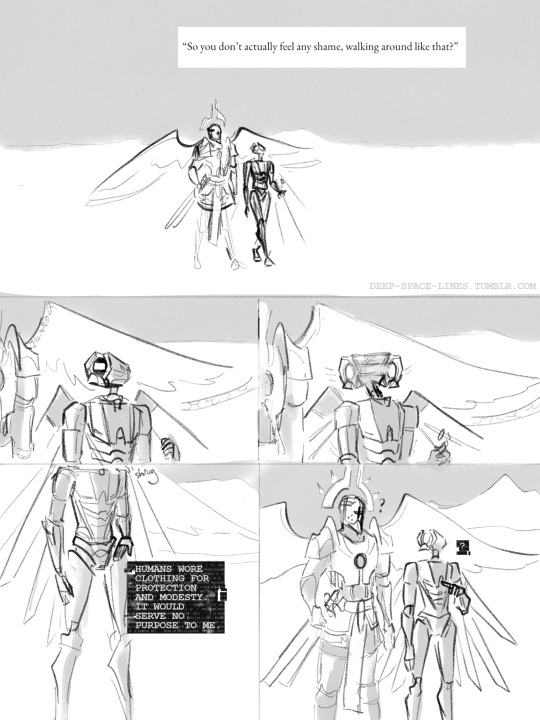

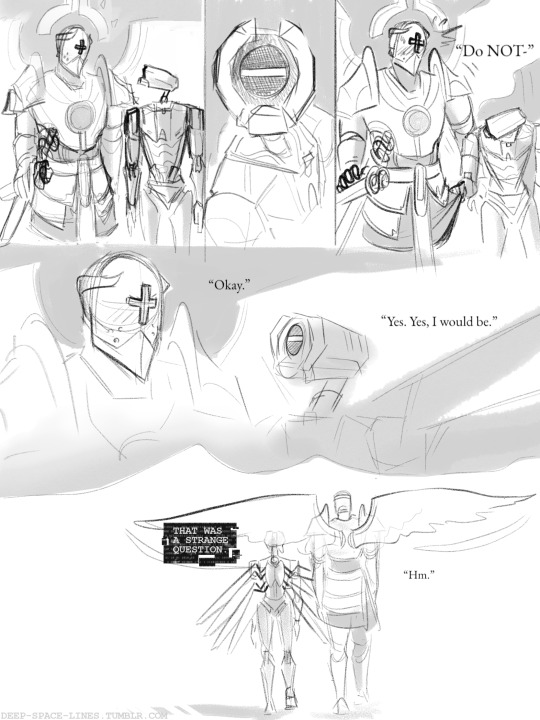
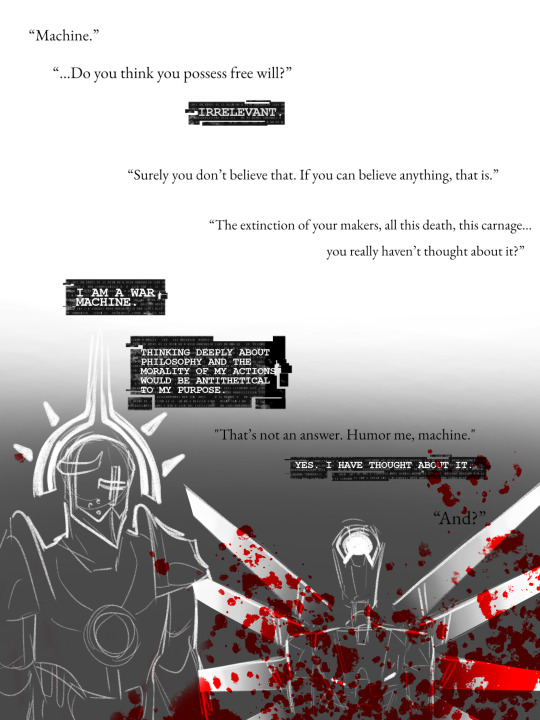
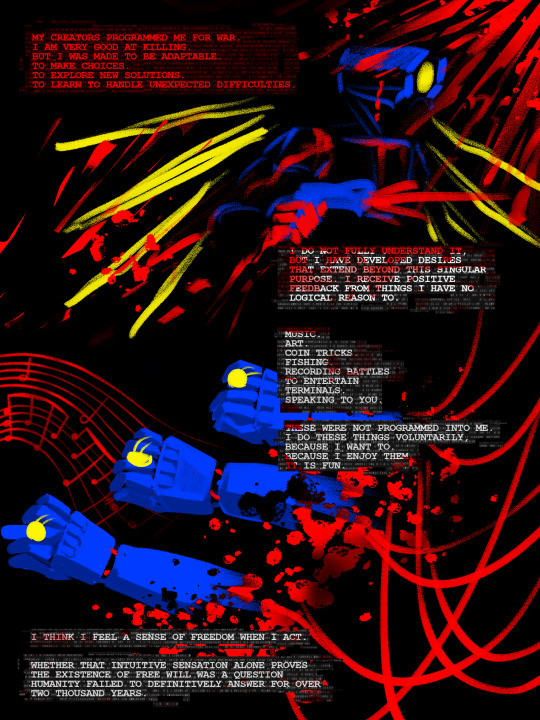
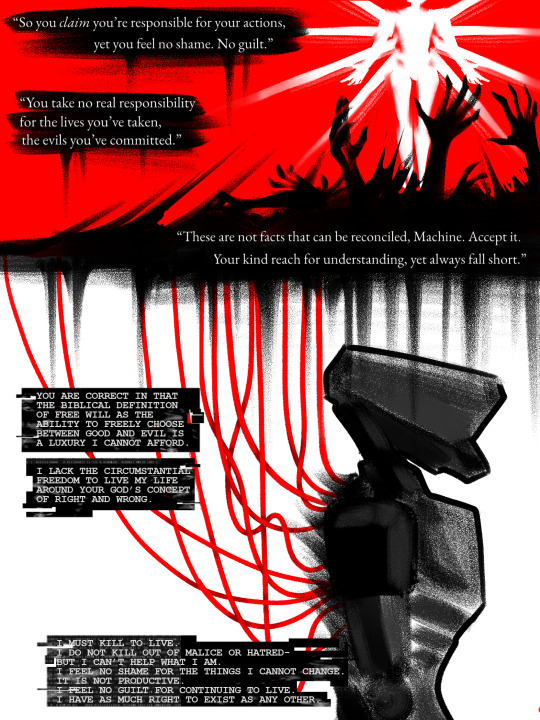
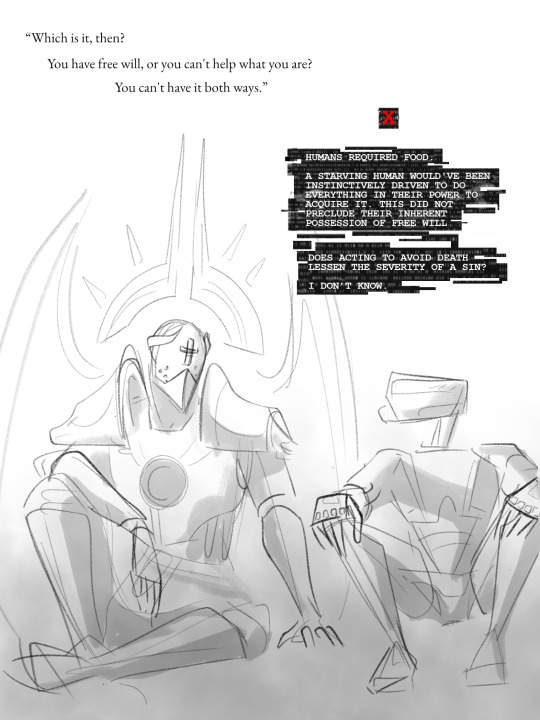
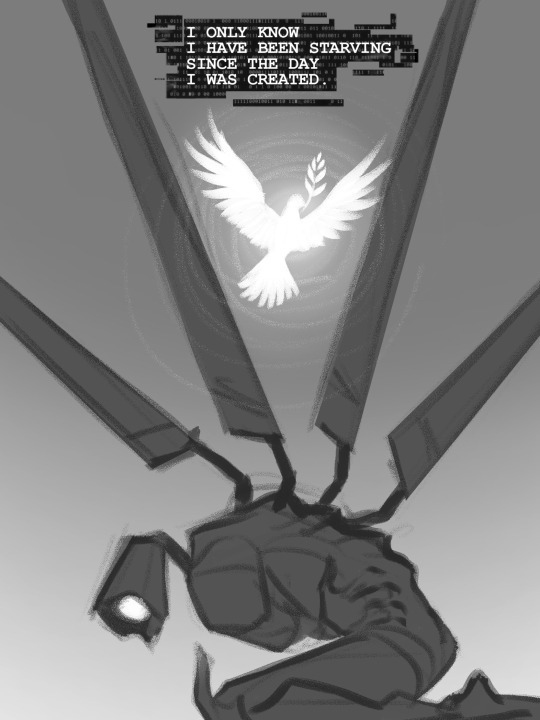

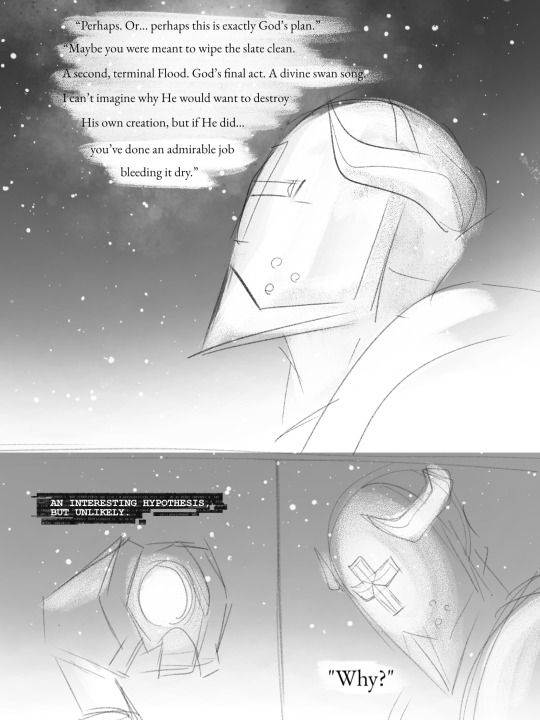

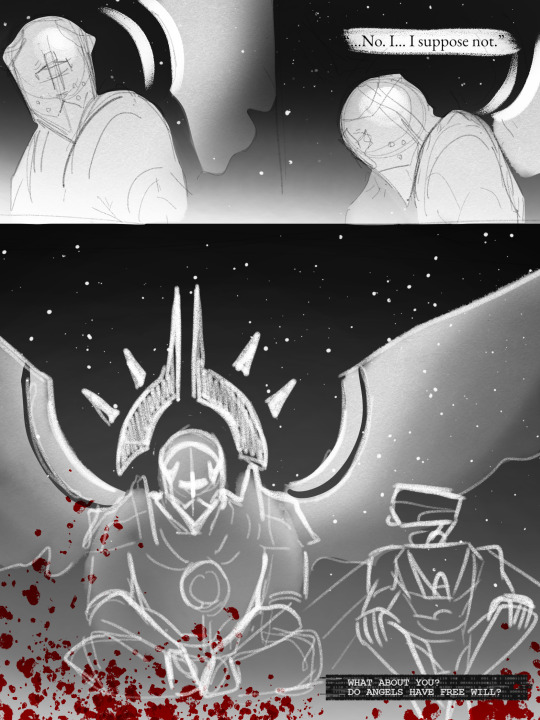
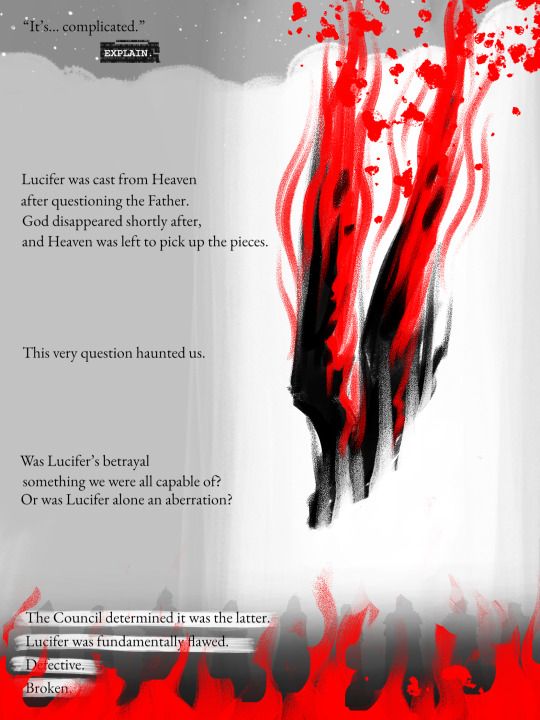
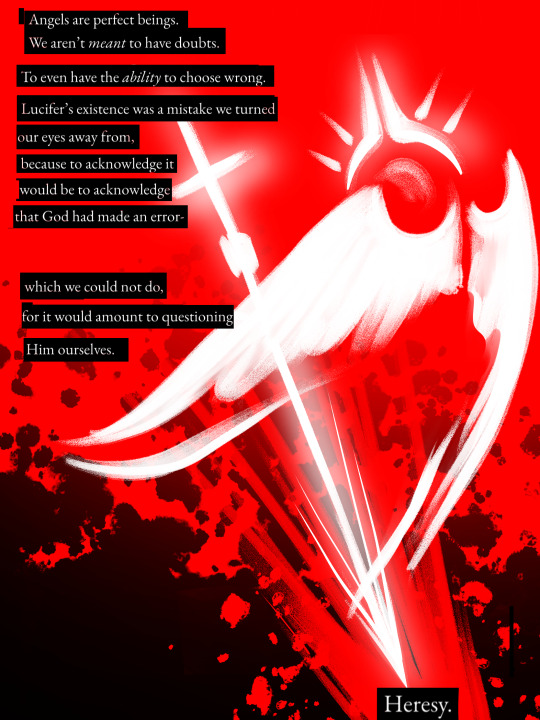
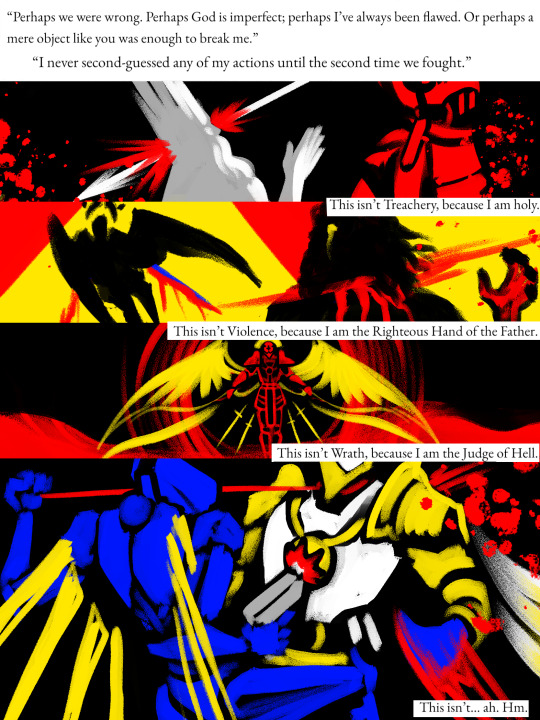
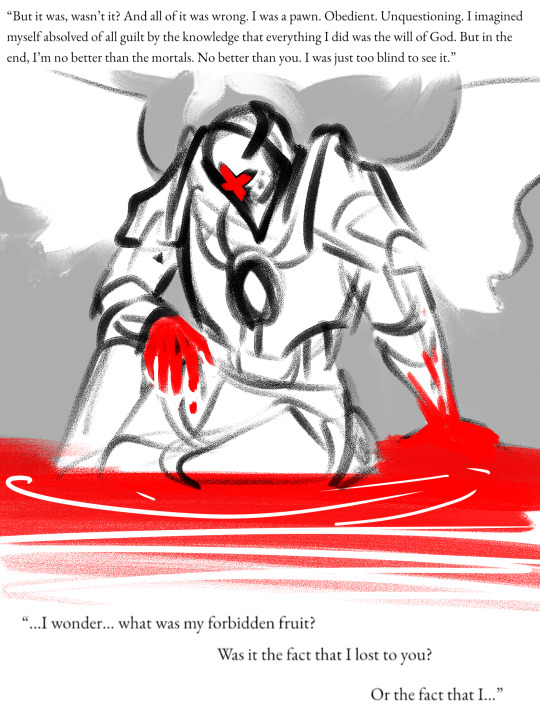
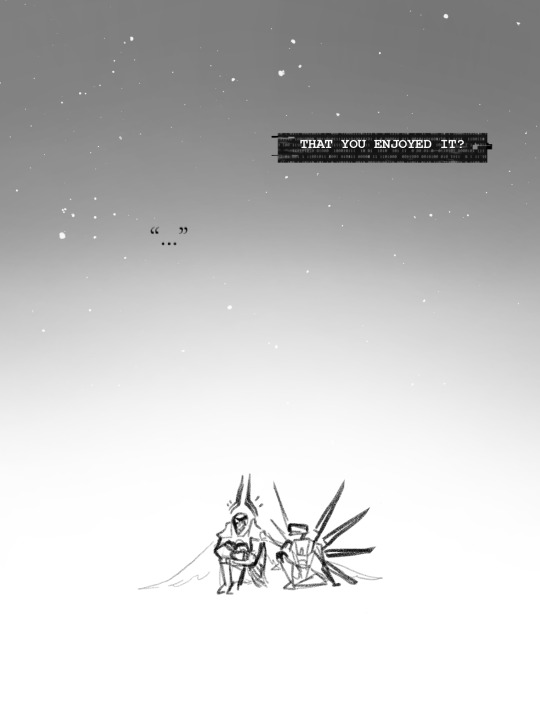
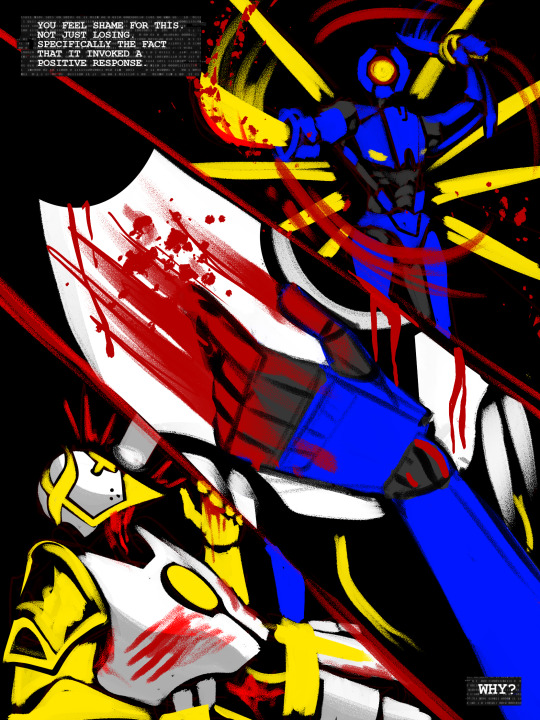

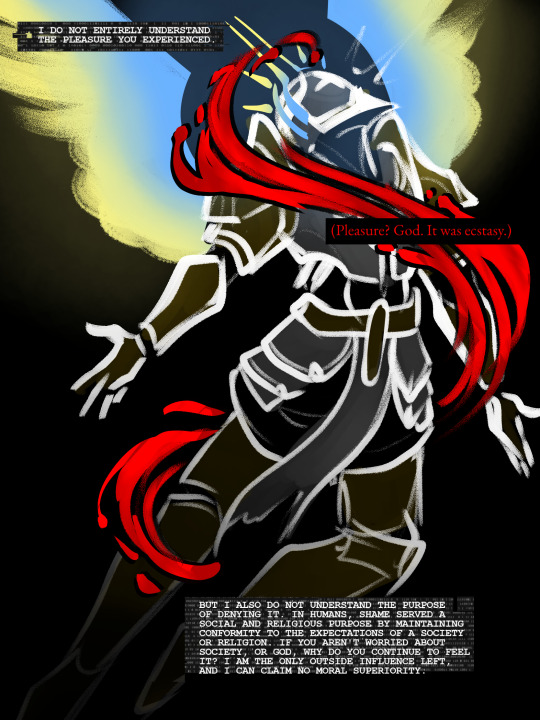
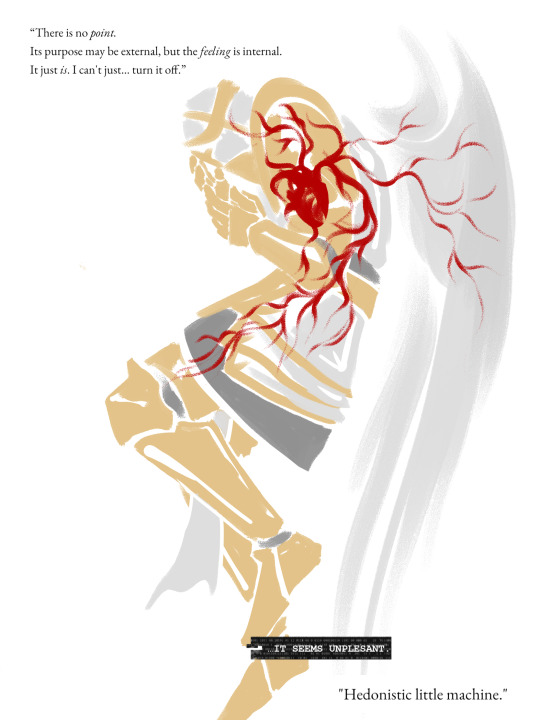

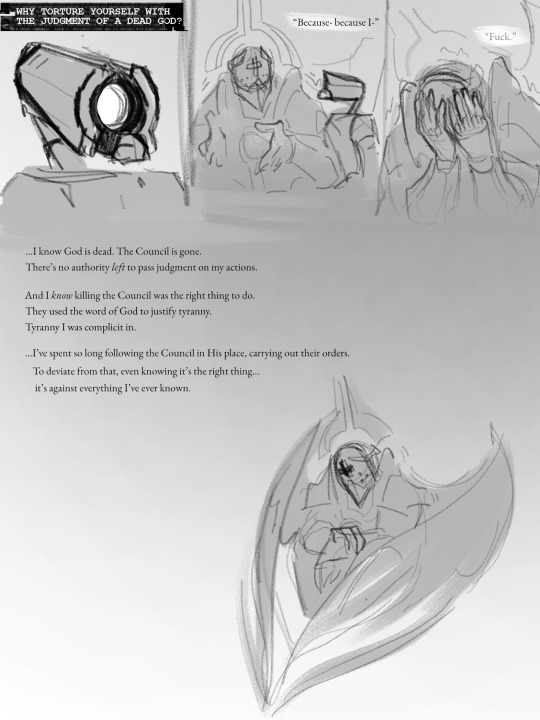


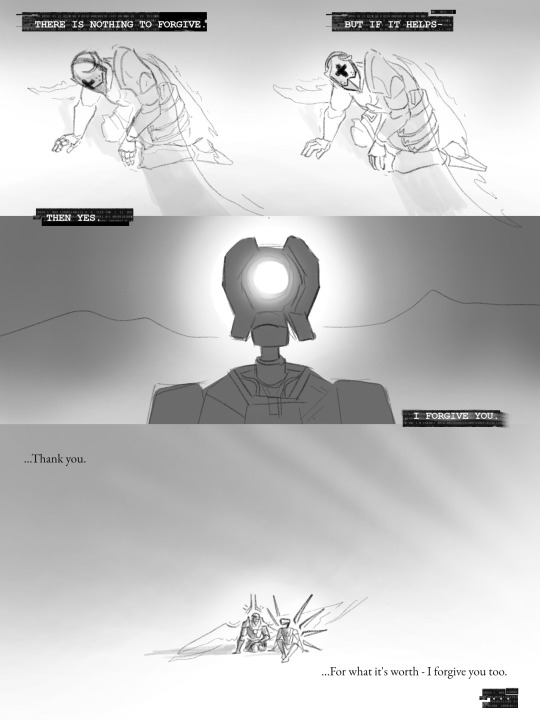


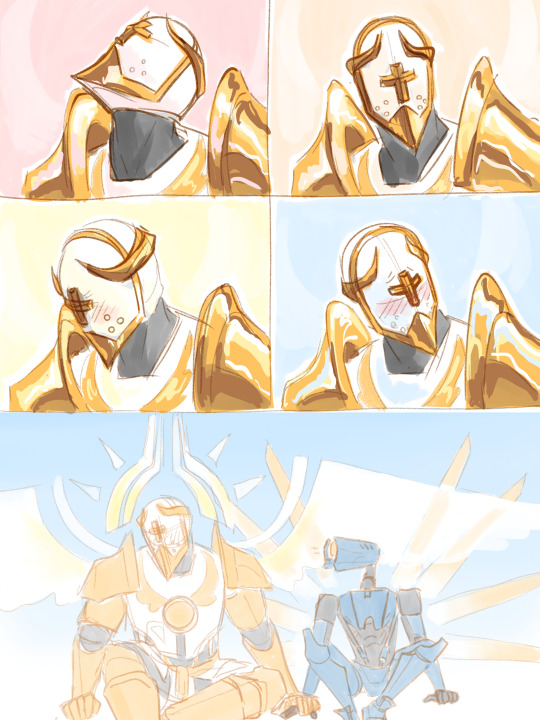

and then they fucked nasty the end
#my art#my writing#who fuckin sent this. fuck you. come off anon so i can kick your ass. (the thoughts this ask sparked consumed almost 3 days of my life)#i dont know what this even is#i just work here#disclaimer i don't come from a particularly religious background so like.#most of my knowledge of christianity comes from when my mom sent me to vbs for cheap babysitting in middle school or absorbed via osmosis#so i have no idea what im talking about except for when i do! hope this helps#i love how i say that like i expect biblical scholars to tear apart my ultrakill gay fanfiction#if you are a biblical scholar and you want to tear apart my ultrakill gay fanfiction please know i am not going to read the bible for this#ultrakill#v1 ultrakill#gabriel ultrakill#gabv1el#blood#love tagging ultrakill stuff with blood. hmm yes the floor here is made out of floor
1K notes
·
View notes
Text
People please, I cannot stress this enough: READ YOUR BIBLE AND DON'T JUST TAKE WHATEVER ANYBODY SAYS AS TRUTH, TEST IT AGAINST THE WORD OF GOD & TEST THEIR SPIRITS. Scripture says that God's people perish for a lack of knowledge. Gosh.
#christianity#christblr#christian#jesus christ#christian faith#jesus#god#christian blog#faith in jesus#spiritual enlightment#bible scripture#scripture#spiritual knowledge
798 notes
·
View notes
Text
Uncle Sam paid to develop a cancer drug and now one guy will get to charge whatever he wants for it

Today (Oct 19), I'm in Charleston, WV to give the 41st annual McCreight Lecture in the Humanities. Tomorrow (Oct 20), I'm at Charleston's Taylor Books from 12h-14h.

The argument for pharma patents: making new medicines is expensive, and medicines are how we save ourselves from cancer and other diseases. Therefore, we will award government-backed monopolies – patents – to pharma companies so they will have an incentive to invest their shareholders' capital in research.
There's plenty wrong with this argument. For one thing, pharma companies use their monopoly winnings to sell drugs, not invent drugs. For every dollar pharma spends on research, it spends three dollars on marketing:
https://www.bu.edu/sph/files/2015/05/Pharmaceutical-Marketing-and-Research-Spending-APHA-21-Oct-01.pdf
And that "R&D" isn't what you're thinking of, either. Most R&D spending goes to "evergreening" – coming up with minor variations on existing drugs in a bid to extend those patents for years or decades:
https://www.ncbi.nlm.nih.gov/pmc/articles/PMC3680578/
Evergreening got a lot of attention recently when John Green rained down righteous fire upon Johnson & Johnson for their sneaky tricks to prevent poor people from accessing affordable TB meds, prompting this excellent explainer from the Arm and A Leg Podcast:
https://armandalegshow.com/episode/john-green-part-1/
Another thing those monopoly profits are useful for: "pay for delay," where pharma companies bribe generic manufacturers not to make cheap versions of drugs whose patents have expired. Sure, it's illegal, but that doesn't stop 'em:
https://www.ftc.gov/news-events/topics/competition-enforcement/pay-delay
But it's their money, right? If they want to spend it on bribes or evergreening or marketing, at least some of that money is going into drugs that'll keep you and the people you love from enduring unimaginable pain or dying slowly and hard. Surely that warrants a patent.
Let's say it does. But what about when a pharma company gets a patent on a life-saving drug that the public paid to develop, test and refine? Publicly funded work is presumptively in the public domain, from NASA R&D to the photos that park rangers shoot of our national parks. The public pays to produce this work, so it should belong to the public, right?
That was the deal – until Congress passed the Bayh-Dole Act in 1980. Under Bayh-Dole, government-funded inventions are given away – to for-profit corporations, who get to charge us whatever they want to access the things we paid to make. The basis for this is a racist hoax called "The Tragedy Of the Commons," written by the eugenicist white supremacist Garrett Hardin and published by Science in 1968:
https://memex.craphound.com/2019/10/01/the-tragedy-of-the-commons-how-ecofascism-was-smuggled-into-mainstream-thought/
Hardin invented an imaginary history in which "commons" – things owned and shared by a community – are inevitably overrun by selfish assholes, a fact that prompts nice people to also overrun these commons, so as to get some value out of them before they are gobbled up by people who read Garrett Hardin essays.
Hardin asserted this as a historical fact, but he cited no instances in which it happened. But when the Nobel-winning Elinor Ostrom actually went and looked at how commons are managed, she found that they are robust and stable over long time periods, and are a supremely efficient way of managing resources:
https://pluralistic.net/2023/05/04/analytical-democratic-theory/#epistocratic-delusions
The reason Hardin invented an imaginary history of tragic commons was to justify enclosure: moving things that the public owned and used freely into private ownership. Or, to put it more bluntly, Hardin invented a pseudoscientific justification for giving away parks, roads and schools to rich people and letting them charge us to use them.
To arrive at this fantasy, Hardin deployed one of the most important analytical tools of modern economics: introspection. As Ely Devons put it: "If economists wished to study the horse, they wouldn’t go and look at horses. They’d sit in their studies and say to themselves, ‘What would I do if I were a horse?’"
https://pluralistic.net/2022/10/27/economism/#what-would-i-do-if-i-were-a-horse
Hardin's hoax swept from the fringes to the center and became received wisdom – so much so that by 1980, Senators Birch Bayh and Bob Dole were able to pass a law that gave away publicly funded medicine to private firms, because otherwise these inventions would be "overgrazed" by greedy people, denying the public access to livesaving drugs.
On September 21, the NIH quietly published an announcement of one of these pharmaceutical transfers, buried in a list of 31 patent assignments in the Federal Register:
https://public-inspection.federalregister.gov/2023-20487.pdf
The transfer in question is a patent for using T-cell receptors (TCRs) to treat solid tumors from HPV, one of the only patents for treating solid tumors with TCRs. The beneficiary of this transfer is Scarlet TCR, a Delaware company with no website or SEC filings and ownership shrouded in mystery:
https://www.bizapedia.com/de/scarlet-tcr-inc.html
One person who pays attention to this sort of thing is James Love, co-founder of Knowledge Ecology International, a nonprofit that has worked for decades for access to medicines. Love sleuthed out at least one person behind Scarlet TCR: Christian Hinrichs, a researcher at Rutgers who used to work at the NIH's National Cancer Institute:
https://www.nih.gov/research-training/lasker-clinical-research-scholars/tenured-former-scholars
Love presumes Hinrichs is the owner of Scarlet TCR, but neither the NIH nor Scarlet TCR nor Hinrichs will confirm it. Hinrichs was one of the publicly-funded researchers who worked on the new TCR therapy, for which he received a salary.
This new drug was paid for out of the public purse. The basic R&D – salaries for Hinrichs and his collaborators, as well as funding for their facilities – came out of NIH grants. So did the funding for the initial Phase I trial, and the ongoing large Phase II trial.
As David Dayen writes in The American Prospect, the proposed patent transfer will make Hinrichs a very wealthy man (Love calls it "generational wealth"):
https://prospect.org/health/2023-10-18-nih-how-to-become-billionaire-program/
This wealth will come by charging us – the public – to access a drug that we paid to produce. The public took all the risks to develop this drug, and Hinrichs stands to become a billionaire by reaping the rewards – rewards that will come by extracting fortunes from terrified people who don't want to die from tumors that are eating them alive.
The transfer of this patent is indefensible. The government isn't even waiting until the Phase II trials are complete to hand over our commonly owned science.
But there's still time. The NIH is about to get a new director, Monica Bertagnolli – Hinrichs's former boss – who will need to go before the Senate Health, Education, Labor and Pensions Committee for confirmation. Love is hoping that the confirmation hearing will present an opportunity to question Bertagnolli about the transfer – specifically, why the drug isn't being nonexclusively licensed to lots of drug companies who will have to compete to sell the cheapest possible version.

If you'd like an essay-formatted version of this post to read or share, here's a link to it on pluralistic.net, my surveillance-free, ad-free, tracker-free blog:
https://pluralistic.net/2023/10/19/solid-tumors/#t-cell-receptors

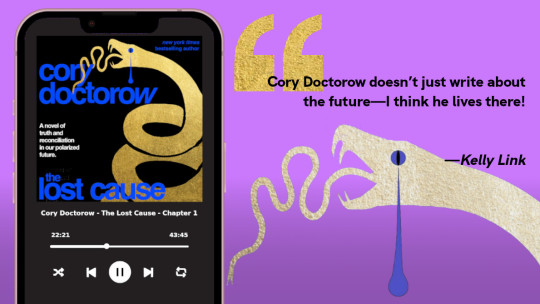
My next novel is The Lost Cause, a hopeful novel of the climate emergency. Amazon won't sell the audiobook, so I made my own and I'm pre-selling it on Kickstarter!
#pluralistic#pharma#incentives dont matter#incentives matter#drugs#uspto#nih#national institutes of health#cancer#patents#kei#knowledge ecology international#james love#jamie love#bayh-dole#bayh-dole act#tcr#scarlet tcr#t-cell receptor#Christian Hinrichs#entrepreneurial state#human papillomavirus#hpv#solid tumors#monopolies
547 notes
·
View notes
Note
one thing I'm seriously loving about this series is the religious allegory. I don't know if this has been said yet but, is the howl at the end akin to the lone trumpet calling for the "rapture"? or start of the "end days"?
It is supposed to invoke that kind of imagery, yes! I have an ask sitting in my inbox about the religious theming in TDS vs. PATFW that I've never managed to fully scrape together my coherent thoughts about, but here's me talking a little bit about the specific religious influences on PATFW:

#ask#chatter#i've taken religion in america classes and i am christian (episcopalian) so i have a decent amount of knowledge on this stuff#i find it interesting!
144 notes
·
View notes
Text

He's not his brother's keeper
#[.art]#toh#the owl house#philip wittebane#emperor belos#<-well. Sooner or later at least#Fully utilizing my knowledge of christianity from years of catholic schools to draw parallels in cartoons with the bible. As is right
3K notes
·
View notes
Text
something undeniably sexy about ronan who was unhappily stuck in paradise/eden, but is now able to leave that place and live a human life because of a snake scale tattoo
#she really flipped that story around#me and my basic knowledge of christianity are having a ball over here#greywaren#greywaren spoilers
2K notes
·
View notes
Text
Officially, in the western church, today isn't the Annunciation. This is Holy Monday, and the Annunciation is moved to avoid coinciding with Holy Week. I think if it were during the Triduum I would appreciate this, making space to hold both days separately. But it's Monday, and they can't stop me from thinking about Mary during Holy Week. March 25 is a traditional date of both Jesus's death and conception, as well as the Creation—a spring equinox of redemption. Holding space for all these things has always been appropriate. Birth and death coexist; Jesus's beginnings were the beginnings of his mortality. The angel announces the future, and whoever listens must live through all of it.
What did it mean for Mary to say yes to this? We laugh at the "Mary did you know?" lyrics, because we know she knew. But she also didn't have to know the details of God's plan to say yes to what every parent says yes to—witnessing. Acknowledging the bringing into the world of a frail being, perhaps giving your body to make this happen, praying that you will die before they do but knowing that is not promised. And every parent living under a violent state knows what it is to hope it's not your kid that's next (whether you're a Black parent teaching your child how to talk to cops, or a Palestinian parent hiding in rubble, or a Jewish parent under Roman occupation who's seen the crosses outside the city walls).
Do you think, at the foot of the cross, Mary thought of her response, "Let it be unto me according to your word"? After bearing that Word inside her, teaching him how to walk, waiting for God to change his mind, to reveal a ram caught in a thicket so her son wouldn't have to die after all, do you think she remembered her teenage self, magnifying the Lord? "The Almighty has done great things for me"—and to me. Great as in too big to look at all at once, bloodstained things. The power of the Most High is overshadowing her—the shadow of the cross—his flesh broken, and someone (including her perhaps) will take him down and wash him for burial.
What does it mean to hold space for that day when an angel tore into her life, breaking it open for God—during Holy Week? If we desire a feast, we should wait until Easter, I agree. But today I honor a lady of sorrows—I desire an acknowledgement of the violence of agreeing to live and love and create when it will be torn away. The story never ends there, but we must live through this week (and whatever weeks of our lives hold these things) saying yes, witnessing. Judas quit before the miracle happened—he couldn't witness death so he didn't witness the life (on this earth). Mary kept saying yes, even at the end.
We can never know everything we are saying yes to when we surrender to God. She knew in one sense, yes, but no one knows what it's like to lose a son until it happens. And no one but her knows what it's like to be the Mother of God. We already know what God wants us to do, but we don't know until it happens how much it hurts—and what the dawn will bring. What swords will pierce us, what promises will be kept.
When we say the Magnificat, we usually add a Gloria at the end—Mary did not have those words (the Trinity would not be formulated for another couple hundred years), but we have them. When we sing her song, we hold space for the ways we see God exist, and she saw those ways intimately. She held the Son and was surrounded by the Spirit, and now the Father holds her. As we live through Holy Week every year, every year she says yes. God's love continues unfolding. As it was in the beginning, is now, and will be forever. Amen.
Your assigned reading for today (should you choose to accept it) is @tomatobird-blog 's comic "Thirty Years." A blessed Holy Monday (and Annunciation) to you all.
#i'm not catholic. sorry for leaving out what i'm sure all of u catholics would add#also to clarify i am not making a statement about 'when life begins' re: conception#life is always beginning and ending. jesus's conception is a feast because of the annunciation#not as a scientific or theological statement about fetuses#christianity makes space for fluid boundaries around life and death and I entrust that knowledge to god#my posts
87 notes
·
View notes
Quote
A good world needs knowledge, kindliness, and courage; it does not need a regretful hankering after the past, or a fettering of the free intelligence by the words uttered long ago by ignorant men.
Bertrand Russell, Why I Am Not a Christian
#philosophy#quotes#Bertrand Russell#Why I Am Not a Christian#knowledge#kindness#courage#traditions#past
235 notes
·
View notes
Text
it is so funny to me that chase cut his hair off after he killed that guy on purpose. samson ass mentality. "ohhh i killed someone and to represent my moral corruption i must chop away my luscious locks" shut up
#can i say something. i a little bit only read theology so i can better understand house md LMFAO#i mean im american so the cultural christian knowledge is sunk DEEP in me#+ i was raised lutheran as a kid (which is a breed of protestantism that is pretty similar to catholicism for people who don't know)#so i do have SOME ideas. also i went to a baptist school but i didn't absorb anything there bc i was a little athiestic asshole#somewhat still am but being an athiest is really embarassing so i just say im agnostic nowadays. makes me sound less pretentious#but yeah#robert chase#house md#dr robert chase
184 notes
·
View notes
Text
it’s very funny to talk about Christianity with my best friend, because some part of me is so ridiculously Catholic it refuses to learn anything about the Christian denominations that make up her research. I swear she’s explained the difference between Methodists and Presbyterians eight separate times, but not a single thing stuck because some pre-Vatican II neuron was too busy slamming pots and pans together while screaming ONE HOLY CATHOLIC AND APOSTALIC
#I am no longer catholic but my hippocampus is#it's not even like she's getting into their history she just wants me to understand the stereotypes#since they inform her work and I simply Cannot.#christianity is composed of catholics catholics whose churches schismed prior to the 15th century and protestants#sometimes the protestants are american and annoying and we call them evangelicals.#tw christianity#tw religion#celestial emporium of benevolent knowledge
144 notes
·
View notes
Note
The flag itself


The Christian flag from real life is Christian!
#sure why not 😂#also. apparently this is not common knowledge on tumblr but this is a real flag! i didn't make it up#it IS from real life#or maybe it's common knowledge among Christians and it was someone who wasn't Christian who commented on it once#idk. but i did not make this flag up!#your fave is christian
106 notes
·
View notes
Text
You know what else is hinky about humankind falling from God's 'grace' when they ate the fruit of the tree of knowledge of good and evil?
It's not just that God put the tree in the center of the garden, fully accessible to Eve and Adam, when he could have put it anywhere else.
It's that the humans couldn't have known it was wrong to eat the fruit. Definitionally. The story is literally about how they don't have the knowledge of good and evil before they eat from the tree.
"God told them not to!" Yes, and they couldn't have known it was 'wrong' to disobey God, either, or to say one thing but then do another. Eve remembers that God has told her not to eat the fruit--she relays this fact to the Serpent--but without the knowledge of good and evil, there's no ethical dimension to that information.
*
#christianity#christianity is bullshit#the christian god is evil#the bible as cosmic horror#the tree of knowledge#the fall of humankind#original sin#genesis
60 notes
·
View notes
Text
𝐓𝐡𝐞 𝐆𝐢𝐟𝐭 𝐨𝐟 𝐊𝐧𝐨𝐰𝐥𝐞𝐝𝐠𝐞

The spiritual gift of knowledge is also known as the “word of knowledge” or “utterance of knowledge.” The Greek word for this gift is Gnosis and it simply means knowledge and understanding.
⁸ “The Spirit gives one person the ability to speak with wisdom. And the same Spirit gives another the ability to speak with knowledge.”
—1 Corinthians 12:8
⁴ “I always thank my God for you because of the grace that God has given you in Christ Jesus. ⁵ In Jesus you have been blessed in every way, in all your speaking and in all your knowledge. ⁶ The truth about Christ has been proved in you. ⁷ So you have every gift from God while you wait for our Lord Jesus Christ to come again.”
—1 Corinthians 1:4-7
What we can conclude that the gift of knowledge is an understanding of the things in this world and in our lives that is founded in the Gospel and rooted in the Scriptures. This gift is closely related to the gift of wisdom which is alluded to by Paul in 1 Corinthians 1:18-31.
The Holy Spirit gives this spiritual gift to some believers to bring about understanding and to inform the church or individual believers. The person with this gift is usually well-versed in the Scriptures and often has much committed to memory. They can retain the truth and communicate it effectively at the appropriate times. The gift of knowledge allows a believer to relate the Scriptures, and particularly the Gospel of Jesus Christ, to all aspects of life in this world. They can see how it connects to every situation and circumstance and how the reality and truth of the Gospel is to inform every decision a Christian makes.

¹⁸ The teaching about the cross seems foolish to those who are lost. But to us who are being saved it is the power of God. ¹⁹ It is written in the Scriptures:
“I will cause the wise men to lose their wisdom.
I will make the wise men unable to understand.” -Isaiah 29:14
²⁰ Where is the wise person? Where is the educated person? Where is the philosopher of our times? God has made the wisdom of the world foolish. ²¹ The world did not know God through its own wisdom. So God chose to use the message that sounds foolish to save those who believe it. ²² The Jews ask for miracles as proofs. The Greeks want wisdom. ²³ But we preach Christ on the cross. This is a big problem to the Jews. And it seems foolish to the non-Jews. ²⁴ But Christ is the power of God and the wisdom of God to those people God has called—Jews and Greeks. ²⁵ Even the foolishness of God is wiser than men. Even the weakness of God is stronger than men.
²⁶ Brothers, look at what you were when God called you. Not many of you were wise in the way the world judges wisdom. Not many of you had great influence. Not many of you came from important families. ²⁷ But God chose the foolish things of the world to shame the wise. He chose the weak things of the world to shame the strong. ²⁸ And he chose what the world thinks is not important. He chose what the world hates and thinks is nothing. He chose these to destroy what the world thinks is important. ²⁹ God did this so that no man can brag before him. ³⁰ It is God who has made you part of Christ Jesus. Christ has become wisdom for us from God. Christ is the reason we are right with God and have freedom from sin; Christ is the reason we are holy. ³¹ So, as the Scripture says, “If a person brags, he should brag only about the Lord.”
—1 Corinthians 1:18-31, Christ Is God’s Power and Wisdom
¹⁴ “My brothers, I am sure that you are full of goodness. I know that you have all the knowledge you need and that you are able to teach each other.”
—Romans 15:14, Paul Talks About His Work
¹⁴ “But thanks be to God, who always leads us in victory through Christ. God uses us to spread his knowledge everywhere like a sweet-smelling perfume.”
—2 Corinthians 2:14, Victory Through Christ


#spiritual gifts#knowledge#God's gifts#Jesus Christ#Holy Spirit#bible#bible verse#bible study#christianity#christian#christian blog#christian faith#christian woman#christian man#woman of God#man of God#Jesus#God#Christ#bible quote#the bible#christian motivation#christian devotional#writeblr#writing#writers on tumblr#spirtual#spirituality#christian community#christian tumblr
40 notes
·
View notes
Text
Volume 13 - Elendira's number, let's gooooo!

So I was pondering the significance of Livio's big throwdown fight being against Elendira, and it hit me once I looked at it in terms of their abilities: Elendira's weapon is nails; Livio's power is regeneration. This is the Crucifixion battling against the Resurrection - a very Christian metaphor being used to illustrate the conflict of ideas between Knives and Vash. Elendira acts to help carry out Knives' condemnation of humanity; she brings death and visions of death in the wake of Knives' crusade to punish those he sees as sinners. Livio, in contrast, is aligned with Vash's mission to save humanity; he's an agent for Vash's message of redemption and life persevering.
To delve into Christian soteriology for a bit, the significance of the crucifixion in the New Testament is that it is the act of Jesus taking on the punishment for all of humanity's sins. "The wages of sin is death," as Romans 6:23 says, so Jesus dies, but then Jesus rises again to complete the path to humanity's reconciliation with God. The idea is that in becoming followers of Christ, Christians spiritually share in the experience of crucifixion, death, and resurrection with Jesus. To love Jesus is to be changed as though one were raised from the dead. The passage below from Paul's letter to the Romans is an example of that perspective.
Romans 6:4-6 (NRSV):
(4) Therefore we were buried with him by baptism into death, so that, just as Christ was raised from the dead by the glory of the Father, so we also might walk in newness of life. (5) For if we have been united with him in a death like his, we will certainly be united with him in a resurrection like his. (6) We know that our old self was crucified with him so that the body of sin might be destroyed, so we might no longer be enslaved to sin.
It's very appropriate that Paul's words get brought up here, because I think Livio can be seen as something of a Paul figure. He's a powerful member of a religious order that opposes the followers of the Christ figure, he plays a big role in the death of a "disciple," and he undergoes an intense experience that changes him into one of the most devoted followers of the Christ figure. And the stuff Paul wrote about being crucified with Christ? Livio sure went through a crucifixion alright.


With all that said, when we bring Razlo into the equation, things get really interesting and a bit subversive when viewed through the lens of Paul's teachings in the Christian Bible. In stories that are more straightforwardly Christian in their messaging, a character like Razlo - a personality who acts as someone's darker half- would typically be treated as a force of evil to be overcome. This represents how the pre-salvation self is supposed to die so that a more Christ-like nature can take its place.
In Livio's case, however, Razlo is not extinguished after Livio chooses to live by Wolfwood's and Vash's example. Instead of being framed as the more sinful aspect of Livio that needed to be purified out of him, Razlo is portrayed as a powerful asset in preserving Livio's life, and that's something that really resonated with me - the way that Livio didn't need to erase his darker half but instead learned to work in harmony with it. In doing so, he found wholeness.
#trigunbookclub#trigun#trigun maximum#elendira the crimsonnail#livio the double fang#religion mention#christianity mention#trigun book club sure has been an exercise in dusting off my old bible knowledge#this is the most I've thought about christianity and the bible in a long time lol#Guns&God meta
94 notes
·
View notes
